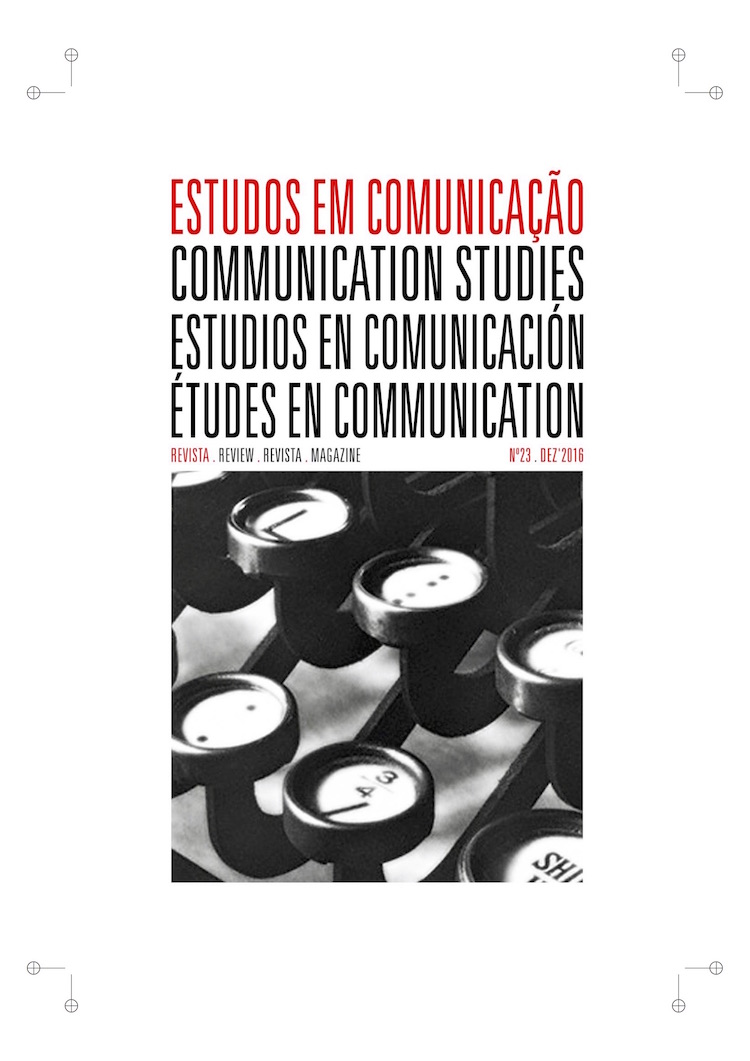O Estado da Arte da Comunicação Organizacional
Abstract
A investigação em comunicação organizacional tem vindo a crescer nos últimos anos e a constituir-se como uma necessidade premente para a compreensão da dinâmica e do comportamento organizacional. Porém, o investimento nesta área de estudo e o entendimento da sua complexidade implica a identificação de um percurso histórico e das linhas de investigação que lhe são inerentes. O presente trabalho, tem como principal objetivo revisitar as diferentes linhas de investigação e os respetivos paradigmas que, historicamente, têm atravessado a investigação em comunicação organizacional até aos nossos dias. Nesse sentido, serão identi- ficados e explicitados os quatro paradigmas principais associados à comunicação organizacional, sendo estes: o paradigma positivista; o paradigma interpretativo; o paradigma crítico e o paradigma dialógico. Esta discussão – praticamente inexistente na literatura, torna-se fundamental não só para percebermos o contexto histórico da comunicação organizacional, mas também para elevarmos o estado de maturidade da disciplina providenciado uma perspetiva integrada da mesma.
References
Alvesson, M. & Ashcraft, K. L. (2009). Critical methodology in management and organizational research. In D. A. Buchannan & A. Bryman (Eds). The sage handbook of organizational research methods (pp. 61-77). Los Angeles, CA: Sage Publications.
Ashcraft, K. L. & Mumby, D. K. (2004). Reworking gender: a feminist com- municology of organization. Thousand Oaks, CA: Sage Publications.
Blair, R.; Roberts, K. & McKecnie, P. (1985). Vertical and network communi- cations in organizations: the present and the future. In R. D. McPhee & P. K. Tompkins (eds). Organizational communication: traditional themes and new directions (pp. 55-77). U.S.A: Sage Publications.
Bouzon, A. (2013). Theoretical approaches in organizational and strategic communication: a review of the french academic literature. In G. Gon- çalves, I Somerville & A. Melo (eds). Organizational and strategic com- munication research: european perspetives (pp. 23-45). Covilhã: Livros Labcom.
Deetz, S. (2001). Conceptual foundations. In F. M. Jablin & L. L. Putnam (Eds). The new handbook of organizational communication: advances in theory, research and methods (pp. 3-46). Thousand Oaks: Sage Pu- blications.
Jones, E.; Watson, B.; Gardner, J. & Gallois, C. (2004). Organizational com- munication: challenges for the new century. International Communica- tion Association, 54: 722-750.
Krone, K. (2007). Trends in organizational communication research: sustai- ning the discipline, sustaining ourselves. Communication Studies, 56 (1): 95-105.
Miller, K. (2001). Quantitative research methods. In F. M. Jablin & L. L. Putnam (Eds). The new handbook of organizational communication: ad- vances in theory, research and methods (pp. 137-160). Thousand Oaks: Sage Publications.
Miller, K. (2012). Organizational communication: approaches and processes. Boston: Wadsworth, Cengage Learning.
Mumby, D. (2001). Power and politics. In F. M. Jablin & L. L. Putnam (Eds). The new handbook of organizational communication: advances in theory, research and methods (pp. 585-623). Thousand Oaks: Sage Publications.
Mumby, D. K. & Stohl, C. (1996). Disciplining organizational communica- tion studies. Management Communication Quarterly, 10: 50-72.
Oliveira, E. & Ruão, T. (2013). Os quatro paradigmas da comunicação es- tratégica e o ensino em Portugal. Atas do VIII Congresso da SOPCOM. Lisboa: Escola Superior de Comunicação Social – Instituto Politécnico de Lisboa.
Putnam, L. & Pacanowsky, M. (eds) (1983). Communication and organizati- ons: an interpretative approach. Beverly Hills, CA: Sage Publications.
Redding, C. (1985). The emergence of organizational communication as a field of study. In R. D. McPhee & P. K. Tompkins. Organizational com- munication: traditional themes and new directions (pp. 15-54). U.S.A: Sage Publications.
Redding, C. & Tompkins, P. (1988). Organizational communication: past and presente tenses. In G. M. Goldhaber & G. A. Barnett (eds). Handbook of organizational communication (pp. 5-33). Norwood: Ablex Publishing.
Ruão, T. (1999). A Comunicação organizacional e a gestão de recursos huma- nos: evolução e actualidade. Cadernos do Noroeste,12(1-2): 179-194.
Ruão, T. (2004). O estado da arte em comunicação organizacional. 1900- 2000: um século de investigação. Atas do III Congresso da SOPCOM, VI LUSOCOM e II Ibérico. Covilhã: Universidade da Beira Interior.
Ruão, T. (2008). A Comunicação organizacional e os fenómenos de identi- dade: a aventura comunicativa da formação da Universidade do Minho, 1974-2006. Tese de Doutoramento, Universidade do Minho, Braga, Por- tugal.
Schockley-Zalabak (2012). Fundamentals of organizational communication: knowledge, sensitivity, skills, values (8o ed). Colorado: Pearson Educa- tion.
Spence, P. R. & Baker, C. R. (2007). State of the method: examination of levels of analysis, methodology, representation and setting in current or- ganizational communication research. Journal of the Northwest Commu- nication Association, 36: 111-124.
Taylor, B. & Trujillo, N. (2001). Qualitative research methods. In F. M. Jablin & L. L. Putnam (Eds). The new handbook of organizational communica- tion: advances in theory, research and methods (pp. 161-196). Thousand Oaks: Sage Publications.
Taylor, J. (1993). Rethinking the theory of organizational communication: how to read an organization. New Jersey: Ablex Publishing.
Wrench, J. S. (2013). Communicating within the modern workplace: chal- lenges and prospects. In J. S. Wrench (Ed). Workplace communication for the 21st Century: tools and strategies that impact Bottom line. CA: Praeger.
Wrench, J. & Punyanunt-Carter, N. (2012). An Introduction to organizational communication. U.S.A: Sage Publications.
Yanow, D. & Ybema, S. (2009). Interpretivism in organizational research: on elephants and blind researchers. In. D. A. Buchannan & A. Bryman (Eds). The sage handbook of organizational research methods (pp. 39- 60). Los Angeles, CA: Sage Publications.
Downloads
Published
Issue
Section
License
Estudos em Comunicação/Communication Studies is an Open Access journal. All its content is freely available without charge to the user or his institution. Users are allowed to read, download, copy, distribute, print, search, or link to the full texts of the articles in this journal without asking prior permission from the publisher or the author. Estudos em Comunicação, by Labcom, is licensed under a Creative Commons Atribuição-NãoComercial-SemDerivações 3.0 Unported License. By submitting your work to Estudos em Comunicação/Communication studies you confirm you are the author and own the copyright, that the content is original and previously unpublished, and that you agree to the licensing terms.


